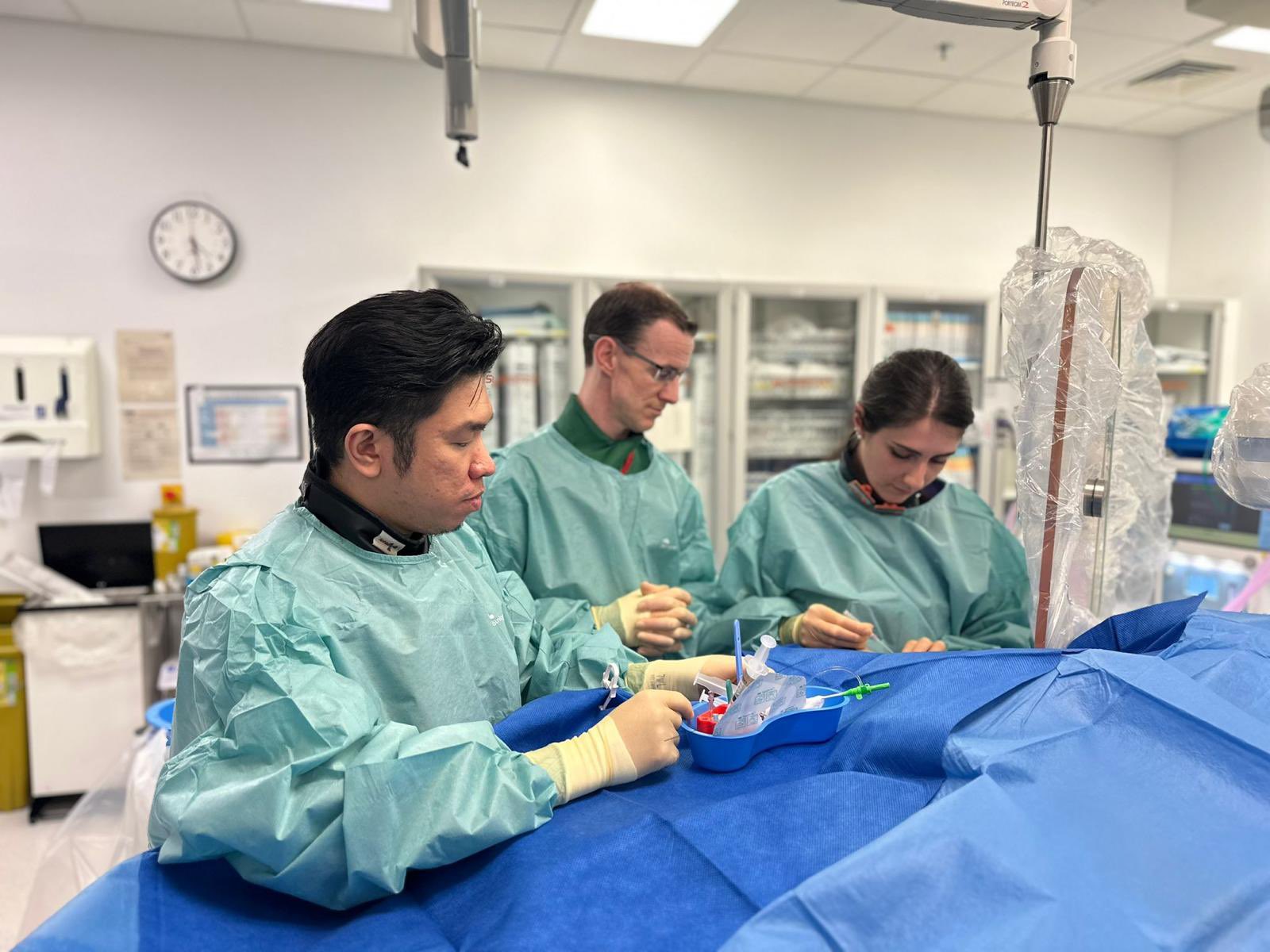'This is just the start' - the heart nurses breaking down professional boundaries

A medical procedure, once the preserve of experienced doctors, in which a tube is inserted through the wrist and onto the heart, has been performed by nurses at St Bartholomew’s Hospital.
Radial access, so-called after the radial artery, uses the wrist as an entry point for a catheter which is then threaded through the body’s network of blood vessels.
An alternative to femoral access, which punctures the thigh, it is the start of the process to diagnose and treat a number of conditions like clogged arteries and irregular heartbeats.
In most cases, radial access causes less discomfort than femoral access and means patients can get out of bed and walk around much sooner after their procedure.
Clinicians at Barts Heart Centre at St Bartholomew’s Hospital perform hundreds of radial access punctures each month as part of treatments such as an angioplasty.
 Traditionally, it was only ever done by a specialist heart doctor, who would also lead the rest of the case.
Traditionally, it was only ever done by a specialist heart doctor, who would also lead the rest of the case.
Applications to the radial access programme opened in the hospital’s catheterisation labs last year.
Two band 6 nurses were chosen, and, after hours of training and simulation, have recently performed their first procedures.
Sara, a junior sister who has completed the course (pictured left with colleague Kevin), said: "It’s a dream come true.
"As a nurse, you see many punctures being performed each week, but I couldn't imagine being the one to do it.
"Doing it for the first time was overwhelming. I feel so fortunate to advance my practice in this way and I hope that many more of my colleagues will follow."
Barts Heart Centre is one of the first units in the UK to offer this training to its nursing staff.
We want colleagues to feel motivated and empowered
Senior sister Paola Ferraro said it was the logical next step for nurses who already have a close relationship with each cath lab patient.
It also shows our commitment to professional development.
She said: "We want our colleagues to feel motivated and empowered and to continue their career with us.
"There are so many possibilities now for nursing. We hope this is just the start."
After a successful pilot, they hope to offer the training to more nursing staff in the future.
The team are also exploring how the project has increased efficiencies in the department by freeing up medical time.
For more information on our heart valve service, visit our website.
Shape your story at Barts Health by visiting our vacancies pages.
 Afrikaans
Afrikaans Albanian
Albanian Amharic
Amharic Arabic
Arabic Armenian
Armenian Azerbaijani
Azerbaijani Basque
Basque Belarusian
Belarusian Bengali
Bengali Bosnian
Bosnian Bulgarian
Bulgarian Catalan
Catalan Cebuano
Cebuano Chichewa
Chichewa Chinese (Simplified)
Chinese (Simplified) Chinese (Traditional)
Chinese (Traditional) Corsican
Corsican Croatian
Croatian Czech
Czech Danish
Danish Dutch
Dutch English
English Esperanto
Esperanto Estonian
Estonian Filipino
Filipino Finnish
Finnish French
French Frisian
Frisian Galician
Galician Georgian
Georgian German
German Greek
Greek Gujarati
Gujarati Haitian Creole
Haitian Creole Hausa
Hausa Hawaiian
Hawaiian Hebrew
Hebrew Hindi
Hindi Hmong
Hmong Hungarian
Hungarian Icelandic
Icelandic Igbo
Igbo Indonesian
Indonesian Irish
Irish Italian
Italian Japanese
Japanese Javanese
Javanese Kannada
Kannada Kazakh
Kazakh Khmer
Khmer Korean
Korean Kurdish (Kurmanji)
Kurdish (Kurmanji) Kyrgyz
Kyrgyz Lao
Lao Latin
Latin Latvian
Latvian Lithuanian
Lithuanian Luxembourgish
Luxembourgish Macedonian
Macedonian Malagasy
Malagasy Malay
Malay Malayalam
Malayalam Maltese
Maltese Maori
Maori Marathi
Marathi Mongolian
Mongolian Myanmar (Burmese)
Myanmar (Burmese) Nepali
Nepali Norwegian
Norwegian Pashto
Pashto Persian
Persian Polish
Polish Portuguese
Portuguese Punjabi
Punjabi Romanian
Romanian Russian
Russian Samoan
Samoan Scottish Gaelic
Scottish Gaelic Serbian
Serbian Sesotho
Sesotho Shona
Shona Sindhi
Sindhi Sinhala
Sinhala Slovak
Slovak Slovenian
Slovenian Somali
Somali Spanish
Spanish Sundanese
Sundanese Swahili
Swahili Swedish
Swedish Tajik
Tajik Tamil
Tamil Telugu
Telugu Thai
Thai Turkish
Turkish Ukrainian
Ukrainian Urdu
Urdu Uzbek
Uzbek Vietnamese
Vietnamese Welsh
Welsh Xhosa
Xhosa Yiddish
Yiddish Yoruba
Yoruba Zulu
Zulu